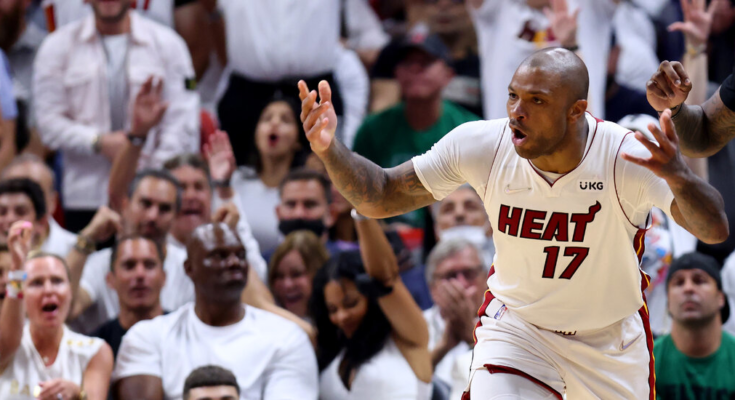MIAMI — A lot of N.B.A. players go through the motions when it comes to boxing out for rebounds on free throws, and no one can really blame them. Most free throws, nearly 80 percent of them, are successful. So why bother boxing out at all?
And then there is Miami’s P.J. Tucker, a 6-foot-5, 245-pound wrecking ball who has spent his career disguised as a power forward. Consider Game 1 of the N.B.A.’s Eastern Conference finals on Tuesday night, as Gabe Vincent, a teammate with the Heat, lined up for the second of two free throws. Tucker took advantage of that window to throw most of his body weight into the midsection of the Boston Celtics’ Jayson Tatum.
It was a bit much. One of the referees advised Tucker to cool it, which did not please him. But it was not going to prevent Tucker from playing the only way he knows how to play — hard — and his toughness was among the reasons the Heat were able to run away with a 118-107 victory in the series opener.
“He inspires everybody,” Heat Coach Erik Spoelstra said, adding: “He’s like a great linebacker. He just gets everybody organized and he communicates so well.”
In a game that Jimmy Butler, as usual, dominated for Miami, finishing with 41 points, 9 rebounds and 5 assists, Tucker posted a bunch of numbers that were nondescript. He had 5 points, 6 rebounds and 3 assists. He shot 2 of 5 from the field and missed both of his free throws. He trudged around the court like a dump truck with a flat tire after rolling his right ankle in the first half.
But his impact was enormous. After Tatum scored 21 points to lead the Celtics’ to an 8-point lead at halftime, Tucker — bad wheel and all — somehow managed to affix himself to Tatum for long stretches of the second half, helping to limit him to 1 of 7 shooting and 8 points the rest of the way.
“What he does doesn’t really get noticed by everybody out there,” Spoelstra said of Tucker. “I don’t have my glasses on, so I don’t even know what his stat line was. But you’re talking about one of the toughest covers. And then when he’s on the weak side, he does all the right things.”
The Heat outscored the Celtics by 12 points in the 31 minutes that Tucker played. They won by 11.
“I didn’t know I would fall in love with a basketball player as much as I have with P.J.,” Butler said. “He’s got the tough job every night of guarding the opposing team’s best player, and then goes down there and shoots the ball five times. You’ve got to respect that.”
The Celtics were short-handed — and short on rest. Their conference semifinal series with the Milwaukee Bucks went to seven games before they were able to advance on Sunday.
As if that had not been challenging enough, they were down two starters for their opener against the Heat: Marcus Smart, the league’s defensive player of the year, was sidelined with a sprained right foot, and Al Horford entered the league’s coronavirus health and safety protocols on Tuesday afternoon.
The Heat had been off since Thursday. They scuffled through a rusty start against the Celtics, missing their first seven field-goal attempts. Tucker was miffed.
“Took us a long time to get aggressive,” he said. “We were way too soft, and they got to pretty much everything they wanted.”
At 37, Tucker is the proud protagonist of one of the more well-chronicled basketball odysseys. He joined the Toronto Raptors for the 2006-07 season as a second-round draft pick out of the University of Texas. But after he played sparingly for the Raptors, he spent the subsequent five seasons playing in Israel, Ukraine, Greece, Italy and Germany, refining his game along the way.
By the time he signed with the Phoenix Suns before the 2012-13 season, he had proved he could do a bit of everything: defend, rebound, facilitate and even score when the opportunity presented itself. An invaluable defender, he won an N.B.A. championship last season after the Bucks picked him up near the trade deadline.
At this late stage, Tucker is closer to the end of his playing days than he is to the beginning, and the wear and tear of his profession was clear during Tuesday’s game. After he rolled his ankle in the second quarter, he hobbled to the locker room. His return appeared in doubt.
But Tucker swapped out his footwear — one of the league’s more prolific sneakerheads, he has hundreds of pairs to choose from — and summoned some divine intervention.
“There’s a genie back there,” Tucker said. “Took one of my wishes.”
Spoelstra recalled checking on Tucker’s availability for the second half.
“He looked at me dead in the eye and said: ‘Don’t even think about it. I’m playing in the second half,’ ” Spoelstra said. “I’m like, ‘All right, I wasn’t even questioning it.’ ”
As he played through pain, Tucker seemed to take out his angst on Tatum, one of the postseason’s emerging young stars. Tucker was like the old guy at the neighborhood park: hobbled but wise, an unshakably annoying presence. The Celtics shot 2 of 15 from the field in the third quarter as the Heat outscored them, 39-14. But again: Tucker saw room for improvement.
“What took us so long?” he asked.
He sank his lone 3-pointer in the fourth quarter and seized the moment by raising his arms to the crowd. It was a rare chance for him to bathe in the spotlight, but his teammates understand his worth.
At the final buzzer, Butler embraced him.
“He does all the little things,” Butler said.


